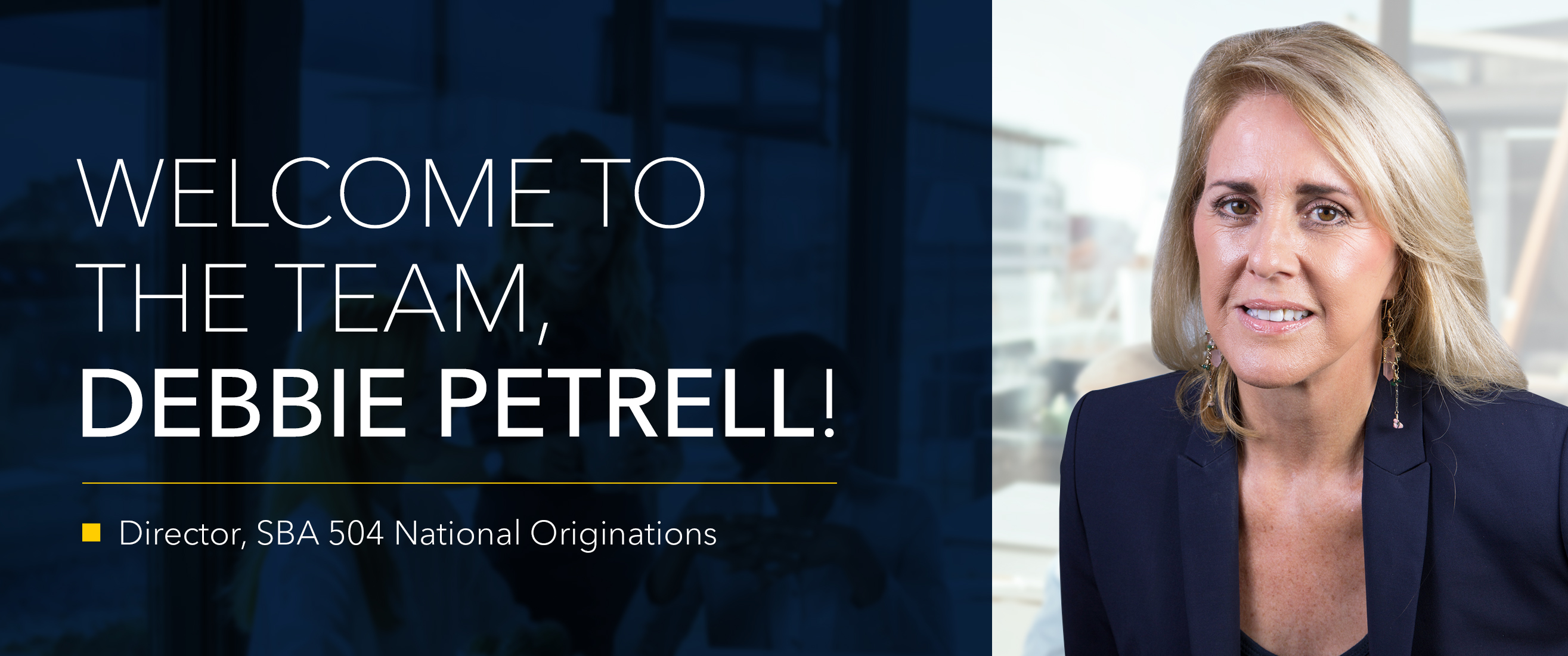WE TRANSFORM BUSINESS NEEDS INTO SOLUTIONS THAT GROW WITH YOUR BUSINESS.
A Guide to Commercial Lending, Part 1: Small Business Lending
When it comes to SBA lending, understanding what funding option is best for your business can seem overwhelming – especially for first-time business or franchise owners. No matter how seasoned a business owner may be, there are significant hurdles to overcome when starting or expanding a business and oftentimes, these challenges require significant funding. As owners start to navigate the process of securing a loan for their business, there are foundational steps to consider that can help position the company in the best light for a potential lender.
By taking the time to prepare preliminary research and analysis of the business, a business owner can help a lender align with company goals and provide a lending option that best fits the business. A lending partner who understands the business model and day-to-day operations can help secure the funding needed to run, maintain, and grow a successful business. Before choosing a lender, business owners should consider the following aspects of their company to ensure there is a clear understanding of expectations and aspirations.

Understanding Your Business
No matter what stage of business a company is in, it’s important to have an in-depth review of revenue, expenses, and operating margins. This analysis can help identify what areas of the business may need to be supported by additional funding. An ongoing understanding of the business’ trajectory can help get ahead of funding and credit needs which can be critical when dealing with an uncertain economy and fluctuating interest rates.
With an understanding of how the business’ financials run, it’s easier to develop objectives that can be accomplished in the near term and create a strategic plan for the company’s future. In the short term, business owners should address what is needed right now to keep the business running, while looking for potential small areas of growth. Long-term goals, such as expansion or acquisition, may be costly and require significant financial management before execution. By creating a realistic snapshot of the business’ current situation, a future lending partner will have a better indication of what funding will be needed to meet objectives.
What to ask yourself when setting goals for a business?
Creating a successful business plan requires looking at the company holistically to ensure it can function properly and what that currently costs. Though maintaining the status quo is crucial, it is also important to keep in mind what, ideally, the business will look like in the next 3, 5, and 10 years. By thinking about the long-term needs of the company, owners can properly gauge how much funding will be necessary to reach these goals. When considering the short- and long-term goals for a business, here are some important questions to ask:
- Where will the labor force come from? According to the U.S. Chamber of Commerce, more than 47 million workers quit their jobs throughout 2021, leading labor shortages affecting almost every industry. This prolonged shortage has required business owners to increase wages to remain competitive in attracting and retaining the staff needed to keep operations running. If a lack of staff is a persistent issue, business owners could also evaluate the option of investing in automation that keeps production or service going with fewer staff. Regardless, labor is a significant portion of expenses that should be taken into consideration, especially if growth is in the future for the company.
- Is the business reliant on a limited number of suppliers? If a business’ success depends on a select number of suppliers, it is important to consider the changes those companies are making to their business models and pricing. These changes may prompt business owners to look to new geographic regions in the U.S. or even internationally to see where a consistent supply of production is available. With increasing costs of materials as well as continued supply chain delays, business owners should expect to spend more on inventory and necessary supplies with elongated delivery periods.
- In the near future, is retirement or selling the business a goal? Succession planning can be a step in the planning process that business owners do not think about until they see it on the horizon. When setting future goals for a business, it’s helpful to consider funds or purchases that may be necessary when it comes time to transition the business.
- What operational changes prompted by the pandemic will remain implemented in the business model? Many businesses needed to abruptly pivot because of the pandemic and throughout shutdowns, it was crucial to maintain tight margins with guidelines consistently in flux. For the businesses that survived, there were likely significant changes to the way they operated which required either investments or cutbacks. The lessons learned from the pandemic should be considered when setting goals for your business to ensure operations are flexible enough to survive similar unforeseen circumstances.
Know Your Options
With a deep comprehension of how your business operates and the cost of maintaining the business, paired with the forethought of short- and long-term goals, the last step in preparation is understanding and identifying what SBA loans are right for your business. Though a supportive lending partner will work with business owners to create the optimal lending solution, it’s helpful to understand what options are available.
- SBA 7(a) – The 7(a) loan is largely considered the mainstay of the SBA guaranty programs and a top financing option for most small business owners looking to borrow up to $5 million. It is a flexible option that allows businesses to secure funding for renovation, acquisition, qualified debt refinancing, partner buyouts, and working capital. With its versatility, the SBA 7(a) loan can be a smart option for most businesses.
- SBA 504 – 504 loans are specific to business owners who require commercial mortgage financing which includes real estate purchases, construction or renovation, and the procurement of heavy equipment/machinery. Because of its specific uses, loan amounts with an SBA 504 loan can go up to $10 million, but the funds cannot be used for working capital or trading asset financing.
- SBA Express – For businesses that need a smaller loan in a shorter amount of time, an SBA Express loan can be a great option. Providing loans up to $500,000, the SBA Express loan offers flexible terms and access to more immediate funding that can be used for working capital, operational expenses, inventory, and marketing.
Having taken the proper foundational steps before speaking with banks about the future of the business, it should be easier to identify a lender that meets the business needs and can align with its goals. When it comes to a company’s long-term success, it is important to have a lending partner that is the right financial fit and that will advocate for your business. At
The Bancorp, our Commercial Lending team is equipped with SBA lending experts who work with companies throughout the country in a wide variety of industries to secure customized lending solutions that help owners support their businesses and
achieve their goals.
Learn more about how The Bancorp Commercial Lending can help your small
business here.
Opinions, findings, or perspectives contained in this blog are those of the authors.
Commercial Lending
Small Business Financing
Small Business Loans
SBA Loans
Hetal Engineer
The Bancorp









